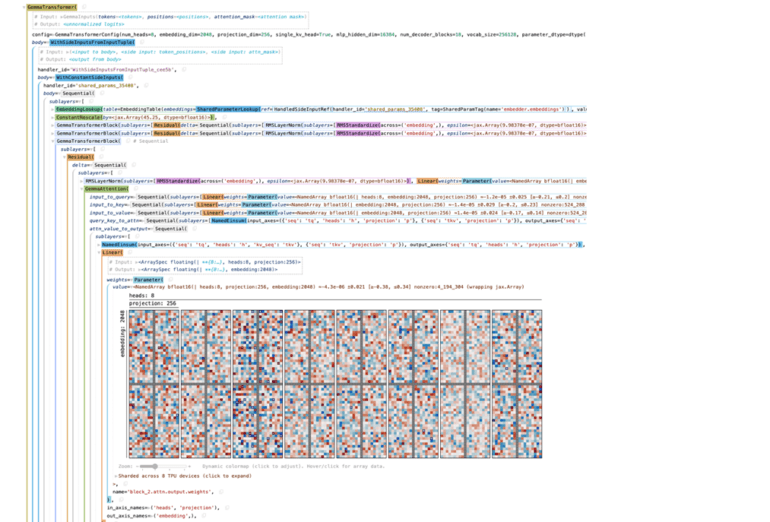- Google DeepMind introduces Penzai, a groundbreaking JAX library for neural network development.
- Penzai emphasizes transparency and functionality, allowing users to easily view and modify models as pytree data structures.
- Designed for seamless integration with Google Colab and the JAX ecosystem, Penzai enhances the accessibility and manipulability of AI models.
- Democratizes AI research by simplifying the process of modifying pre-trained neural networks, fostering innovation and exploration.
- It offers a suite of modular tools, including penzai.nn for model structure exploration and adjustment and penzai.treescope for enhanced visualization.
- Empowers users with advanced capabilities through modules like penzai.core.selectors and penzai.core.named_axes.
- Incorporates penzai.data_effects for flexible management of side arguments and state variables.
Main AI News:
Google DeepMind has recently unveiled Penzai, a cutting-edge JAX library poised to revolutionize how researchers develop, visualize, and modify neural networks. This innovative solution is meticulously crafted to seamlessly integrate with Google Colab and the JAX ecosystem, marking a significant leap forward in the accessibility and manipulability of AI models.
Penzai represents a novel approach to neural network development, placing a strong emphasis on transparency and functionality. Presenting models as legible pytree data structures empowers users to easily inspect and manipulate them, providing unprecedented insight into their inner workings. Particularly valuable post-training, this feature offers invaluable insights into model behavior and facilitates adjustments to optimize performance.
The primary objective of Penzai is to democratize AI research by streamlining the process of modifying pre-trained neural networks. This democratization enables a broader spectrum of researchers to explore and innovate with existing AI technologies, driving progress in the field and uncovering new applications. With its intuitive interface, Penzai removes barriers to entry in AI research, making the technology accessible to all.
Penzai stands out for its diverse array of modular tools, which can be utilized independently or in concert. Notably, the penzai.nn (pz.nn) module introduces a revolutionary combinatorial approach to neural network libraries, distinguishing it from conventional frameworks like Keras or Haiku. By granting users access to a model’s complete forward pass structure, pz.nn facilitates detailed examination and real-time adjustments, catering to developers’ need for precision and flexibility.
Another key component, penzai.treescope (pz.ts), enhances model and data structure visualization. This Python pretty-printer surpasses standard renderers, providing in-depth insights into JAX Pytrees and enabling visualization of multidimensional arrays.
Penzai’s pz.select module, also known as penzai.core.selectors, empowers users to intricately modify and patch pytrees. Leveraging advanced capabilities, this tool facilitates complex modifications beyond simple parameter adjustments. Additionally, the pz.nx module, or penzai.core.named_axes, introduces a named axis system, simplifying the transition between named and positional programming paradigms without necessitating API relearning. Collectively, these tools amplify the utility of user work, fostering more efficient and effective goal attainment.
Furthermore, the library incorporates penzai.data_effects (pz.de), offering a flexible system for managing side arguments, random numbers, and state variables across pytree traversal. This feature grants users unprecedented control over model manipulation, further enhancing Penzai’s appeal and utility.
Conclusion:
Google DeepMind’s release of Penzai marks a significant milestone in the neural network development landscape. By prioritizing transparency and functionality, Penzai not only enhances the accessibility and manipulability of AI models but also democratizes AI research, opening doors for broader exploration and innovation. Its suite of modular tools and advanced capabilities will likely spur further advancements in AI technology and foster a more dynamic and inclusive market environment.

